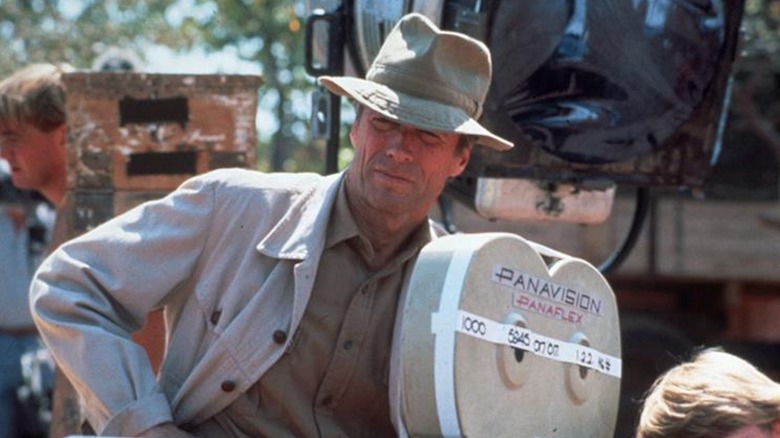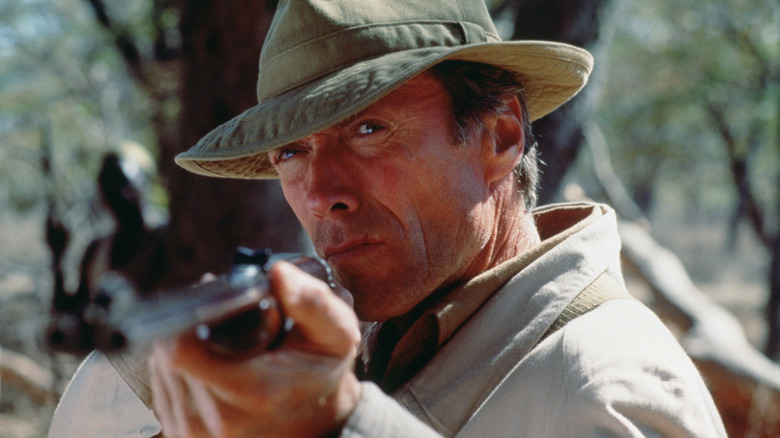One Of Clint Eastwood's Biggest Flops Is A Spiritual Remake Of A Classic Story
Some stories are simply so good, and so applicable to various professions and lifestyles, that you can't tell them just once. Whenever a filmmaker makes a movie about a protagonist pursuing an all-consuming obsession that unnecessarily places himself and his colleagues in danger, you figure they're taking their crack at Herman Melville's "Moby Dick." Films as different as Steven Spielberg's "Jaws," David Lean's "The Bridge on the River Kwai" and Ron Howard's tepid retelling of the actual event that inspired Melville's novel, "In the Heart of the Sea," have all investigated such madness. Appropriately, though, it's possible no one's hit the nail on the head more squarely than John Huston.
Huston was the perfect director for "Moby Dick" because, to a certain extent, he'd gone very close to full-Ahab on the set of "The African Queen." His borderline self-destructiveness ("borderline" because, despite his erratic behavior, he delivered a masterpiece that earned Humphrey Bogart his only Academy Award for Best Actor) nearly put Pulitzer Prize-winner James Agee in the grave (the writer, who shared many of Huston's vices, would find the dirt four years later). Worst of all was that Huston demanded to shoot "The African Queen" on location in the Belgian Congo — not because it was aesthetically ideal, but because it was an elephant-hunting paradise.
"The African Queen" co-scripter Peter Viertel (who stepped in for Agee after his 1951 heart attack), wrote a thinly fictionalized novel that was closely based on Huston's big-game hunting madness, and, after years of development slip-ups, Clint Eastwood finally brought Viertel's "White Hunter, Black Heart" to the screen. It's one of Eastwood's biggest flops, but he's never stretched more as an actor, nor has he ever expressed such ambivalence about what it means to be a man.
Eastwood explores the dark side of filmmaking in White Hunter, Black Heart
Eastwood turned 60 in 1990, and he seemed hellbent on making his mark as a filmmaker. He'd come up short with the admirably understated "Bird," which gave the jazz-fan director the opportunity to explore another kind of artistic self-destructiveness, but he was on much firmer ground with "White Hunter, Black Heart."
In terms of artistic temperament, Eastwood is a different breed from Huston. While the latter was prolific in his own right, Eastwood eliminates all distractions when he's shooting a movie. He believes he's done more than half the job by casting correctly and reuniting with the crew he's worked with for, in some cases, decades. He's not the hedonistic machine that Huston could be at his height; he doesn't drink deep into the night, get into fistfights and sort it all out in the morning over a few sets of tennis. This is why he's still alive and talking about making a new movie at the age of 95.
Huston's behavior on the set of "The African Queen" was the antithesis of Eastwood's process. But it's not the carousing that strikes me as un-Eastwood, it's the obsession with killing an elephant that hurtles the star into a role that, to this day, marks it as the most challenging part he's ever taken on. Eastwood's version of Huston (named John Wilson), is an incorrigible bastard. He possesses morals (e.g. Wilson loses a fistfight against a hotelier who racially abuses a Black employee), but the whole point of making this movie is to bag an elephant. Wilson never convincingly states why he must kill such a majestic creature; he just assumes that his power as a Hollywood director will give him the opportunity to do something few people on this planet have ever done.
"White Hunter, Black Heart" isn't classic Eastwood, but it is essential for the way it castigates Wilson for his abuse of power — which gets another man killed because, when the moment arrives, he lacks the nerve to put the beast down. Wilson is a great filmmaker, he is principled, but he does not believe the world's rules apply to him. By the end of the film, he seems more than chastened. All the talent and bravado in the world can't cover up what he knows to be true: as a man, John Wilson is a fraud. The failure of "White Hunter, Black Heart" (which made $2 million against a $24 million) led Eastwood to make the worst movie in his career with "The Rookie."

